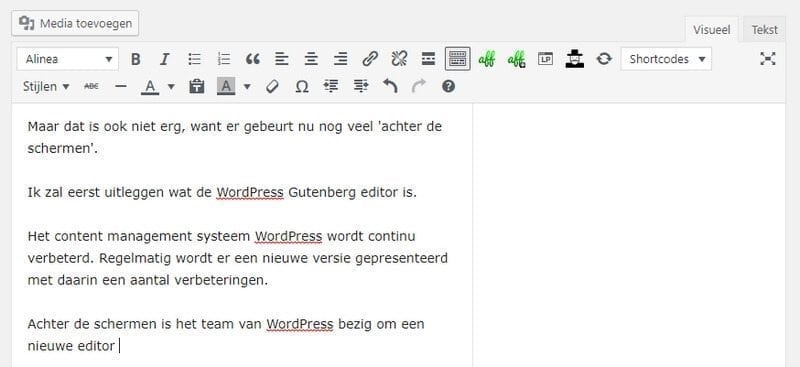Have you heard of the WordPress Gutenberg editor?
There is still a lot going on behind the scenes and it will be a while before the new editor is introduced.
But it will eventually have an impact on the way you write and format your articles in WordPress.
Shortly you will be seeing a preview in this article – in a video- of the new editor.
What is the WordPress Gutenberg editor?
First I will explain what the WordPress Gutenberg editor is.
The content management system WordPress is improved constantly. A new version with several improvements is regularly presented.
Behind the scenes the WordPress team is working hard on an improved editor.
With the current editor you can format messages or pages. It is displayed with icons at the top of your text and it is comparable with Microsoft Words word processing program.
You can edit the font, add bold or italic words, a colour, etc. See the example below:

The editor is the most important part of WordPress, because with this you can make your articles public for your audience.
Because of the advancing technology and the increase of mobiles, Automattic (the owner of WordPress) has decided to renew the editor.
Editor advantages
According to Matt Mullenweg, who developed WordPress, the WordPress Gutenberg editor will:
- Do things on smartphones and tablets that were not possible before;
- users will never again see shortcodes;
- text from the program Word Microsoft or Google Docs can be transferred 1 on 1 without containing codes that ‘disfigure’ the text;
- editing messages will be easier, which will result in more time for writing;
- and it will be easier to handle plugins.
It comes down to that it will be easier for you, as a user, to display your content clearly. This will happen by creating blocks, filling it in and by displaying them.
Also adding social media posts and videos will become easier by using blocks.
Johannes Gutenberg
 In short, a small revolution is taking place in the publishing of articles. Which is why the editor is called Gutenberg, named after the inventor of the printing press, Johannes Gutenberg.
In short, a small revolution is taking place in the publishing of articles. Which is why the editor is called Gutenberg, named after the inventor of the printing press, Johannes Gutenberg.
This German worked on his most famous work, the Gutenberg Bible, in Strasbourg and Mainz which was finished in 1455.
Gutenberg also caused a revolution, because the printing press allowed mass distribution and made publication accessible for everyone.
Which is also WordPress’s mission, democratize publication.
WordPress 5.0
Back to the WordPress Gutenberg editor. It will be a while before the new editor is launched.
The expectation is that we will be working with it in the WordPress 5.0 version.
Until this time the people that are working on it have time to improve the editor.
Because like always with new developments, there is quite some criticism on the new editor.
But this is definitely heard by the WordPress team.
There have now already been various updates to finetune the editor.

How does the WordPress Gutenberg editor work?
You can already integrate the new Gutenberg plugin into your website. For this you can download the plugin in the WordPress Catalogue, where you find all the plugins available to your website.
BEWARE: the plugin is still in BETA, which means the plugin has not yet been released by the developers. The plugin is still being tested, which means it can still contain bugs and errors.
But it doesn’t need to hold you back to at least try out the plugin on a test website.
The editor works as follows: when you create a message now, you can format it by using blocks. With the right mouse click you can call the editor and format the message.
For example by adding a subheader, or changing a word to italics or bold.
Also the use of media will be easier. Now you are often messing around with the image measurements or with placing them. For this there have been made quite a few improvements within the editor.
You can for example sort every paragraph into headers, text, subheaders, a photo gallery, add quotes and videos and social media.
Take a look at this video with the first impressions of how the new editor works. Here you can already get an idea of the possibilities:
Conclusion
A lot is probably going to happen before the new editor will be launched.
And maybe even more difficult, everyone will need to embrace the new editor. A great quote says:
‘The difficulty lies not so much in developing new ideas as in escaping from old ones.’ (John Keynes, 1883-1946)
And indeed…
The difficulty does not lie in developing new ideas, but in escaping old ones.
This is also the case with the Gutenberg editor. It will take some getting used to in the beginning to work with it.
But in my experience; once you have worked with it for a couple of months, you won’t want to go back to the old situation.
And you will be able to write even more great blogs for your website.
But there will be some improvements in the upcoming future, because the new editor also has its downsides.
But the team will be – we expect – working hard to solve this.




